Guest blogger - Dr Anne Monsour, professional historian.
There has been a Lebanese presence in Queensland for almost 140 years. This is not obvious because until the 1940s, immigrants from Modern Lebanon were called Syrians. The arrival of increasing numbers of Lebanese in Queensland in the last two decades of the nineteenth century was part of a mass emigration from the Syria/Lebanon region. By 1890, Lebanese were in Brisbane, Townsville, Charters Towers, Barcaldine, Rockhampton, Maryborough and the Darling Downs. While the numbers in Brisbane continued to increase, so too did the dispersal of Lebanese throughout Queensland. Five years later, they were as far north as Thursday Island, in western towns such as Normanton, Croydon, Winton, Longreach and Charleville, in the Darling Downs, and in towns and cities along the coast. Although the entry of Lebanese was significantly restricted by the Immigration Restriction Act of 1901, throughout most of the twentieth century, there was a continuous Lebanese presence in many towns and cities throughout Queensland.
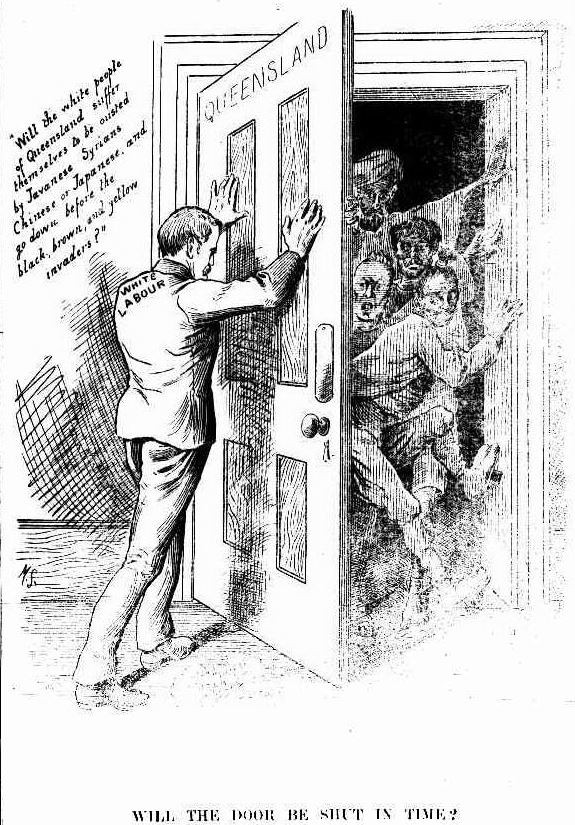
In the 1890s, the arrival of Lebanese in increasing numbers coincided with a period of economic recession, severe drought and developing nationalism which resulted in the broadening of anti-Chinese legislation to include all non-Europeans. Pervasive legislative discrimination against non-Europeans in employment restricted choices and contributed significantly towards most of the early Lebanese immigrants being self-employed in commercial occupations. In Queensland, for example, there were more than thirty separate Acts restricting occupational freedom. Between 1885 and 1947, fifty-five per cent of the Lebanese who applied for naturalization were in business in the retail sector as storekeepers, drapers, mercers or general dealers. Twenty-five per cent listed hawking as their sole occupation, and four per cent combined hawking with storekeeping or farming. With the inclusion of hawking, approximately eighty per cent of Lebanese immigrants were self-employed in a trading enterprise. Lebanese immigrants were able to create a niche as hawkers and storekeepers because they were marginal economic activities that did not threaten the job opportunities of white workers.
As a result, many Lebanese established successful and enduring retail businesses all over Queensland. One such business was that founded in 1885 by the brothers, Joseph and Richard Arida at Charters Towers. Within six years, the Aridas also had stores at Hughenden, Cloncurry and Winton. The All Nations Warehouse was a direct importer of boots and shoes, drapery, clothing, millinery and fancy goods. In 1908, the business amalgamated with the Anthony stores at Selwyn, Normanton and Collinsville. By the 1920s, Joseph and Richard had entrusted the management of the business to their niece, Wadiha Anthony, and her son, Albert Joseph Anthony. After Richard Arida’s death in 1944, the Anthonys continued operating the business.
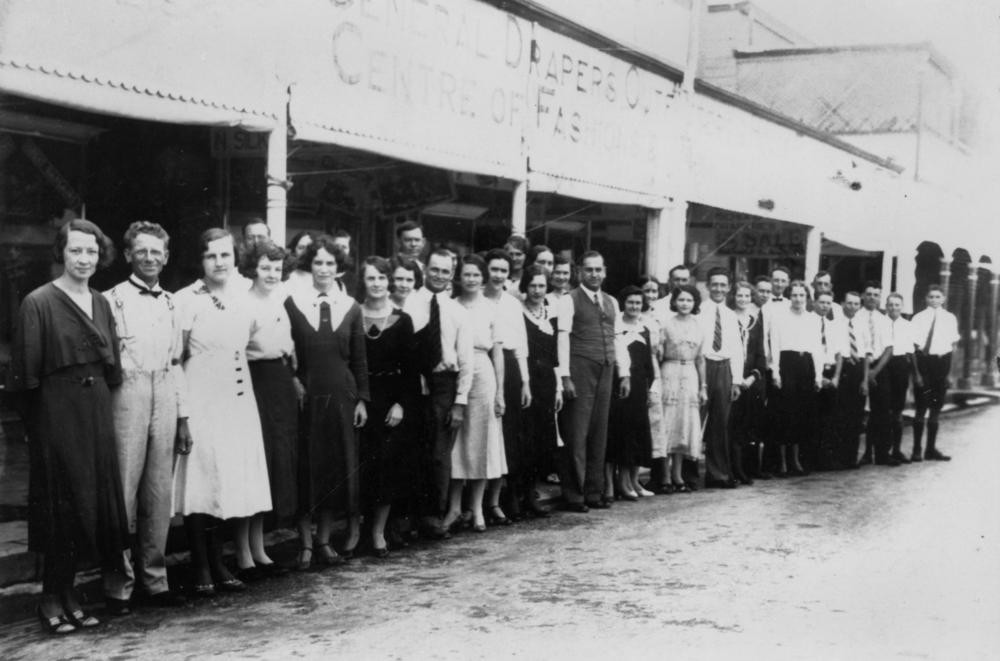
Abraham Selim Mellick and his brother, Habib, were teenagers when they came to Australia in 1899. Following a period of hawking in New South Wales, they moved to Townsville where they had relatives. After hawking in the Townsville district, Abraham established a store in Innisfail (then Geraldton) in 1902. By the 1940s, Abraham had brought his six brothers and two of his three sisters to Australia, and they were operating as drapers or mercers in Innisfail, Townsville, Mossman, Tully and Cairns. The Innisfail store started by Abraham, open for business for 100 years in 2002, closed in 2004 when his daughter, Thelma retired.
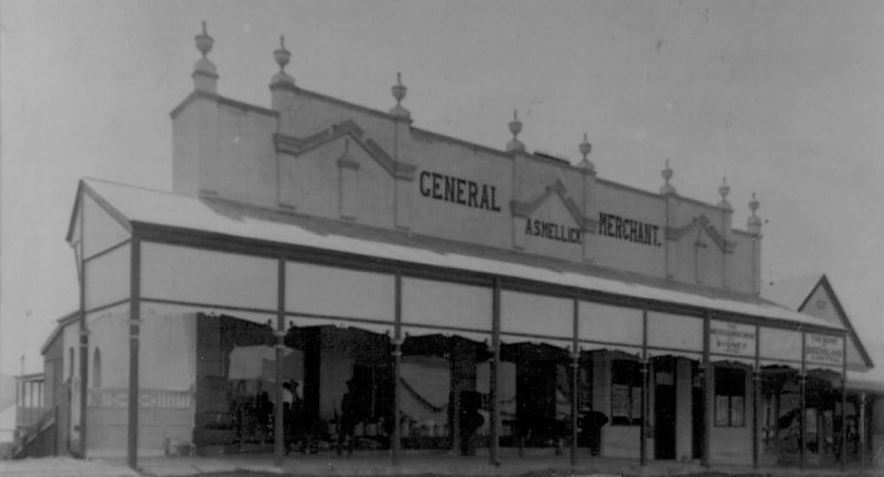
During the 1890s, other Mellicks, all from the same village, Bturrum, worked as hawkers in the areas around Maryborough, Rockhampton and Townsville before establishing stores. The Mellick Brothers drapery store was established in Rockhampton by 1895.17 By 1900, Mellicks were operating drapery stores in Townsville, Longreach, Blackall and Rockhampton. In 1949, there were Mellick stores in Townsville, Cairns, Goondiwindi, Ayr, Ingham, Babinda, Innisfail, Giru, Rockhampton, Longreach, Halifax, Winton and Home Hill.
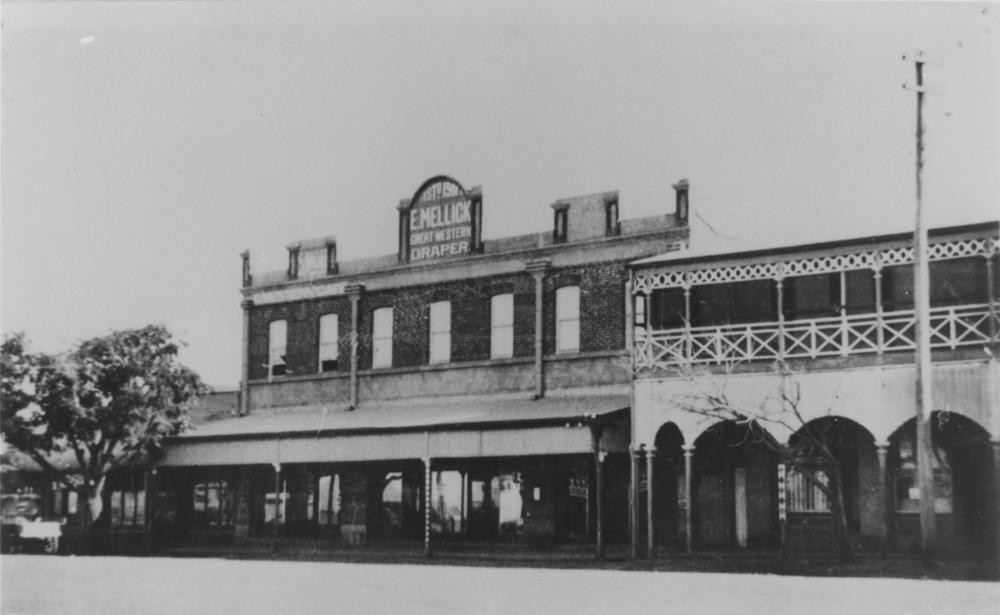
Lebanese retail businesses were characteristically family enterprises. While the success of the Calile Malouf business, which began in 1893 and continued until 1970, can be attributed to good management, the involvement of family was also an important factor. While Calile and his wife, Ada initially worked together, eventually all their children were involved in the business: ‘…as we left school each one of us, you know around about 15 or 16…were taken in as a partner’. Starting out in the 1890s, George Abraham went hawking, his wife operated their store at Goombungee and they employed a woman to look after their eight children at home. When the children were old enough, all of them, male or female, were set up either on a farm or in a store while their father continued hawking. In a later example, all ten of Norm and Lavina Hanna’s children worked in the drapery store they established in Ruthven Street, Toowoomba in 1956. The business has been extended four times and Hannas Department Store is still operating successfully. Currently, John, Jimmy and Anthony are the partners in the business and twelve family members work in the store.
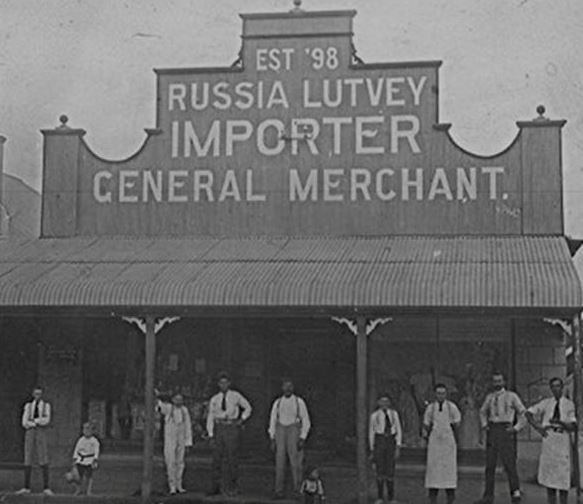
While a significant number of the second generation entered professions in fields such as medicine, dentistry, law, commerce, and education, many also continued to be self-employed in commercial enterprises and demonstrated an enduring attachment to the places their immigrant parents had adopted as home. All six of Russia and Eva Lutvey’s sons spent their lives in Gayndah where their father established a general store in 1898. Throughout their lives, the Lutvey brothers were active in many of Gayndah’s business, service, social and sporting organisations. Both Anthony and Michael served as Shire chairman and Gayndah’s Tony Lutvey Avenue and Mick Lutvey Street commemorate their contribution.
In 2013 Thelma Mellick was the Cassowary Coast Regional Council’s Citizen of the Year. Previously, Thelma, Abraham Selim Mellick’s daughter, a life member of the Innisfail Chamber of Commerce and also of the Innisfail Choral and Orchestral Society, had been awarded a British Empire Medal for services to Music and the Arts in North Queensland (1984), a Johnstone Shire Council Cultural Award (2000) and a ‘Paul Harris’ Fellowship from the Innisfail/Fitzgerald Rotary Club (2003).
The three sons of Joseph Bakhash who opened the Parisian Cafe in Cloncurry in 1914, remained in their birthplace, established businesses, served on organisations such as the Shire Council and the Fire Brigade board, and participated in the town’s sporting activities.29 In his maiden speech to the House of Representatives in 1993, the Honourable Robert Katter Jnr, MHR, the Member for Kennedy and grandson of Lebanese immigrant, Carl Katter who settled in Cloncurry, said this of his father, the Honourable Bob Katter Snr, MHR: ‘…you could not take north-west Queensland out of Bob Katter, but you could also not take Bob Katter out of north-west Queensland, which he loved and where he lived and died’.30
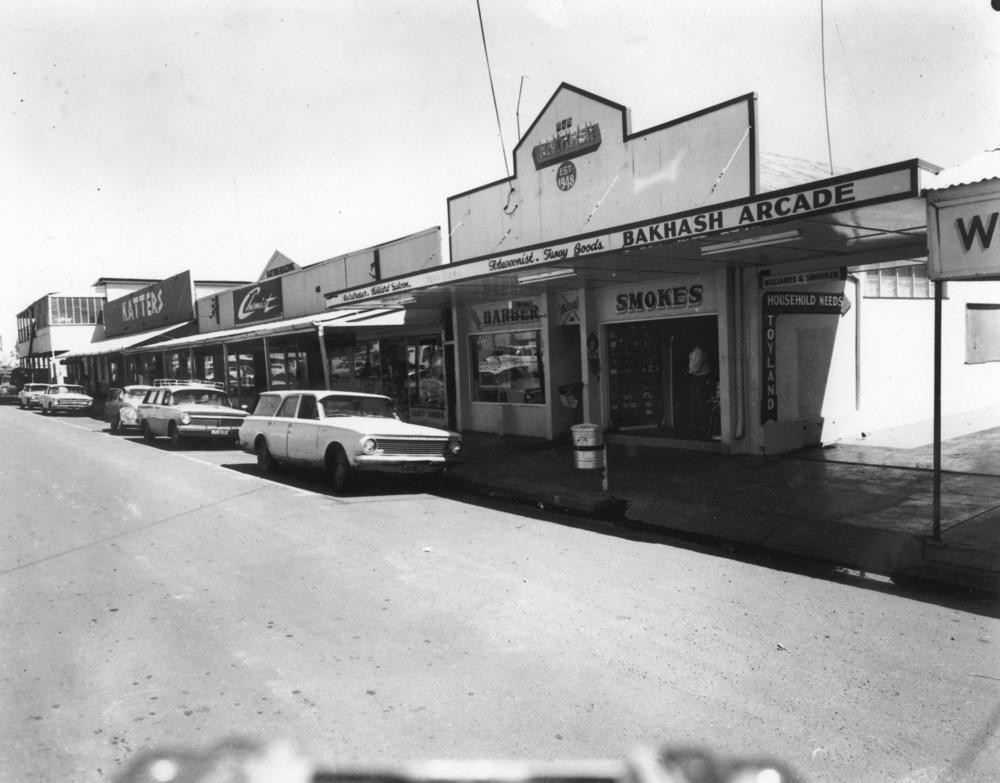
While many factors contributed to the dispersed settlement of Lebanese immigrants, their preparedness to settle in regional Queensland enabled them to establish businesses that met local needs, were long-lasting and facilitated their active participation in their adopted communities.
Further reading
- Anne Monsour (ed.), Raw Kibbeh: Generations of Lebanese Enterprise, Coogee: Australian Lebanese Historical Society, Inc., 2009
- Anne Monsour (ed.), Here to Stay: Lebanese in Toowoomba and South West Queensland, Coogee: Australian Lebanese Historical Society, Inc., 2012
- Anne Monsour, Not Quite White : Lebanese and the White Australia Policy 1880 to 1947, Teneriffe: Post Pressed, 2010
References
- The early immigrants were from the Ottoman region of Greater Syria, so their classification as Syrians and as Turkish subjects were both technically correct. In practice, though, these people did not identify with these modern national identity labels; they were instead loyal to their family, religious sect and village.
- Anne Monsour, Not Quite White: Lebanese and the White Australia Policy 1880 to 1947, Brisbane, Post Pressed, 2010, p. 116.
- Institutionalised discrimination imposed on non-Europeans by State and Commonwealth legislation was pervasive and included: exclusion from certain industries and occupations; denial of the right to vote or stand for parliament; exclusion from citizenship, restrictions on their ability to hold leases and own property; and disqualification from social services such as the invalid and old-age pensions. See: NAA, A1194, 15.20/5615, Disabilities of Aliens and Coloured Persons within the Commonwealth and Its Territories, 1920, Prime Minister’s Department and QSA, Item ID, 339564, List Showing Restrictions or Disabilities in Queensland Applicable to Aliens, 1943.
- Anne Monsour, ‘Traders by Nature or Circumstance: The Occupational Pathways of Early Syrian/Lebanese Immigrants in Australia,’ Labour and Management in Development 15 (2014).
- Andrew Markus, Australian Race Relations 1788-1993, St Leonards, NSW: Allen & Unwin, 1994, p. 120.
- Diane Menghetti, 'Arida, Joseph Dominique (1863–1924)', Australian Dictionary of Biography, National Centre of Biography, Australian National University, , published first in hardcopy 1993.
- Cairns Post, 3 September 1982; QPO Directories, 1940-1949.
- Anne Monsour (ed.), Raw Kibbeh: Generations of Lebanese Enterprise, Coogee, NSW, Australian Lebanese Historical Society, 2009, p. 113.
- Queensland Post Office (QPO) Trade Directory, 1894-1895.
- QPO Alphabetical Index, 1949.
- Minnie Jacobson, Interview with Anne Monsour, Brisbane, 1991.
- Hazel Yarad, Interview with Anne Monsour, Brisbane, 1995.
- Judith Hanna, ‘The Hannas of the Darling Downs’, in Noel John Lindsay & Justin Craig eds, Stars Under the Southern Cross: the Untold story of Queensland Family Businesses, Gold Coast: Bond University, 2001, p. 80.
- Hannas: Our History
- Carmel King, A New Beginning, Brisbane: Author, 1994.
- pp. 43 & 55; Central & North Burnett Times, 10 July, 1986.
- Anne Monsour, ‘Thelma Mellick: Citizen of the Year’, Australian Lebanese Historical Society Newsletter, 45, Spring 2013, pp. 5-6.
- Bakhash, ‘The Bakhash Family of Cloncurry’, in B. Armstrong, Beyond the Call of Duty: Frontier Doctor David Harvey Sutton , (The Bicentennial Project of the Cloncurry Historical Society with Personal Historical Accounts), Brisbane: Boolarong Publications, 1989, p. 79.
- Commonwealth of Australia, House of Representatives (1993).Parliamentary Debates (Official Hansard),
Comments
Your email address will not be published.
We welcome relevant, respectful comments.